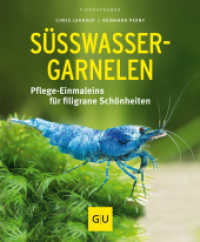- ホーム
- > 洋書
- > 英文書
- > Philosophy
Full Description
Philosophy has inherited a powerful impulse to embrace either dualism or a reductive monism-either a radical separation of mind and body or the reduction of mind to body. But from its origins in the writings of the Stoics, the first thoroughgoing materialists, another view has acknowledged that no forms of materialism can be completely self-inclusive-space, time, the void, and sense are the incorporeal conditions of all that is corporeal or material. In The Incorporeal Elizabeth Grosz argues that the ideal is inherent in the material and the material in the ideal, and, by tracing its development over time, she makes the case that this same idea reasserts itself in different intellectual contexts. Grosz shows that not only are idealism and materialism inextricably linked but that this "belonging together" of the entirety of ideality and the entirety of materiality is not mediated or created by human consciousness. Instead, it is an ontological condition for the development of human consciousness.
Grosz draws from Spinoza's material and ideal concept of substance, Nietzsche's amor fati, Deleuze and Guattari's plane of immanence, Simondon's preindividual, and Raymond Ruyer's self-survey or autoaffection to show that the world preexists the evolution of the human and that its material and incorporeal forces are the conditions for all forms of life, human and nonhuman alike. A masterwork by an eminent theoretician, The Incorporeal offers profound new insight into the mind-body problem
Contents
Acknowledgments List of Abbreviations Introduction 1. The Stoics, Materialism, and the Incorporeal 2. Spinoza, Substance, and Attributes 3. Nietzsche and Amor Fati 4. Deleuze and the Plane of Immanence 5. Simondon and the Preindividual 6. Ruyer and an Embryogenesis of the World Conclusion Notes Bibliography Index








